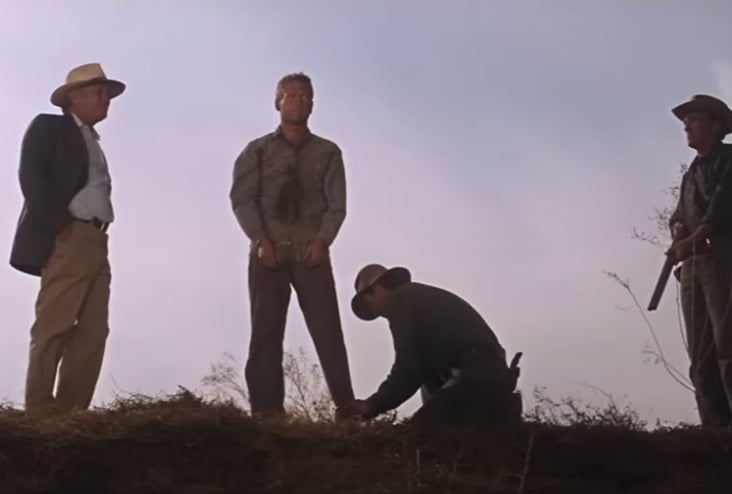The 1967 movie Cool Hand Luke features Lucas “Luke” Jackson, a prisoner working on a chain gang. At one point, after Luke is captured following an escape, the warden parades him before the other prisoners. When he tells Luke that the leg irons he’ll be wearing are “for your own good,” Luke replies, “Wish you’d stop being so good to me, Captain.”
The warden explodes, hits Luke with a club, and says “Don’t you ever talk to me that way! Never! Never!” Realizing he has lost control of himself in front of the other inmates, the warden then parrots words he has undoubtedly learned in some sociology workshop: “What we’ve got here is … failure to communicate.”
That line aptly summarizes the current relationship between the American citizen and the federal government.
For decades now, some in our government have made a game of hiding or ignoring the causes and circumstances of key events. Our intelligence and federal law enforcement officials seem especially adept at this art of concealment.
One case in point among many: Remember the bombing of Oklahoma’s Alfred P. Murrah Federal Building in the spring of 1995? Nearly 30 years later, the FBI still refuses to release thousands of pages of documents related to that murderous act of terrorism.
In 2022, the Baltic Sea’s Nord Stream pipeline linking Russia to Germany was sabotaged. Someone in our government certainly knows who set off those explosives, that or our intelligence agencies are incompetent. Meanwhile, the American public is left in the dark.
During the COVID pandemic government misinformation and deception ruined thousands of businesses, damaged the education of American children, and caused countless needless deaths. Yet no one from government has been held accountable for this disaster.
Our country has just lived through some of the strangest weeks in our history, all thanks in part to the silence and the sleight of hand practiced by our government and a host of other players. The June 27 presidential debate, the July 13 attempted assassination of former president Donald Trump, the July 20 announcement of Joe Biden’s withdrawal from the presidential campaign, and the immediate media- coronation of Vice-President Kamala Harris as the new candidate have tumbled out of the clown car so fast that the head spins.
All of these events have prompted unanswered questions. Why was a presidential debate scheduled before the national conventions, an act unprecedented in our history? Why do we still know so little about the attempted assassination of Donald Trump? How is it possible that a man deemed mentally unfit as a presidential candidate will remain in the Oval Office for six more months? By what obscure machinations did Kamala Harris automatically become the Democratic presidential candidate? Who is the Wizard of Oz behind the curtain of these events, pulling levers and covering them up with smoke and mirrors?
Speculation abounds, but facts and truth are missing in action. Those in power are practicing their usual deliberate tactic of failing to communicate.
That strategy has consequences. In April 2024, the Pew Research Center found that only 23 percent of Americans trust their government to do right “almost always” or “most of the time.” Given the events of late June to the present, we might suspect that canyon of distrust has widened considerably.
A marriage or a friendship in which all trust is lost soon ceases to exist. The marriage will likely end in divorce, the friendship in enmity.
But what happens when citizens lose trust in their government? If the government reforms and opens up avenues of communication, then trust may be restored. But the thing about government that makes it different from a spouse is that even an unreformed government can retain the power and the means to maintain a “relationship” with its citizens, whatever they may prefer. It’s not so easy to get out of an abusive relationship with government. It becomes a soft dictatorship, exerting its will and its laws by force, propaganda, and continued deceptions.
How do citizens resist such a corrupted government of silence and coverups?
Faced with soft authoritarianism, we must answer with soft rebellion. We vote for candidates who will bring a scrub brush and a bucket of cleanser to D.C. We especially look for politicians of whatever stripe who will put the American interests ahead of a party agenda. By phone and email we demand that our elected officials stop hiding information from us. We peacefully protest actions that infringe on our freedoms or are contrary to our American ideals and traditions. We ally ourselves with all Americans who understand the danger of our government’s covert operations.
Some people scoff at such suggestions as weak and futile. That’s true, but only because so few of us have actually tried these remedies.
By remaining silent, we are complicit in the government’s deliberate failures to communicate.
Now is the time to make our voices and our demands for transparency heard.

Leave a Reply